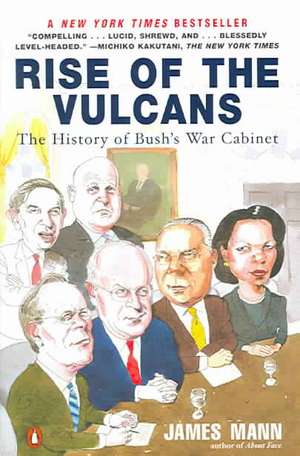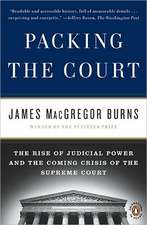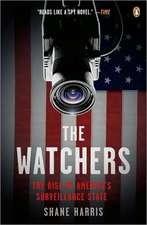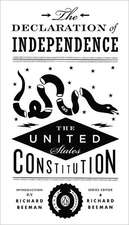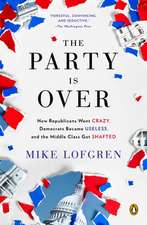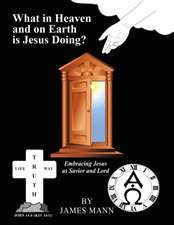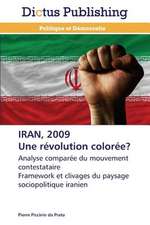Rise of the Vulcans: The History of Bush's War Cabinet
Autor James Mannen Limba Engleză Paperback – 31 aug 2004 – vârsta de la 18 ani
When George W. Bush campaigned for the White House, he was such a novice in foreign policy that he couldn't name the president of Pakistan and momentarily suggested he thought the Taliban was a rock-and-roll band. But he relied upon a group called the Vulcans—an inner circle of advisers with a long, shared experience in government, dating back to the Nixon, Ford, Reagan and first Bush administrations. After returning to power in 2001, the Vulcans were widely expected to restore U.S. foreign policy to what it had been under George H. W. Bush and previous Republican administrations. Instead, the Vulcans put America on an entirely new and different course, adopting a far-reaching set of ideas that changed the world and America's role in it. Rise of the Vulcans is nothing less than a detailed, incisive thirty-five-year history of the top six members of the Vulcans—Dick Cheney, Donald Rumsfeld, Colin Powell, Paul Wolfowitz, Richard Armitage, and Condoleezza Rice—and the era of American dominance they represent. It is the story of the lives, ideas and careers of Bush's war cabinet—the group of Washington insiders who took charge of America's response to September 11 and led the nation into its wars in Afghanistan and Iraq.
Separately, each of these stories sheds astonishing light not only on the formative influences that brought these nascent leaders from obscurity to the pinnacle of power, but also on the experiences, conflicts and competitions that prefigured their actions on the present world stage. Taken together, the individuals in this book represent a unique generation in American history—a generation that might be compared to the "wise men" who shaped American policy after World War II or the "best and brightest" who prosecuted the war in Vietnam. Over the past three decades, since the time of Vietnam, these individuals have gradually led the way in shaping a new vision of an unchallengeable America seeking to dominate the globe through its military power.
Separately, each of these stories sheds astonishing light not only on the formative influences that brought these nascent leaders from obscurity to the pinnacle of power, but also on the experiences, conflicts and competitions that prefigured their actions on the present world stage. Taken together, the individuals in this book represent a unique generation in American history—a generation that might be compared to the "wise men" who shaped American policy after World War II or the "best and brightest" who prosecuted the war in Vietnam. Over the past three decades, since the time of Vietnam, these individuals have gradually led the way in shaping a new vision of an unchallengeable America seeking to dominate the globe through its military power.
Preț: 141.66 lei
Nou
Puncte Express: 212
Preț estimativ în valută:
27.11€ • 28.20$ • 22.38£
27.11€ • 28.20$ • 22.38£
Carte disponibilă
Livrare economică 24 martie-07 aprilie
Preluare comenzi: 021 569.72.76
Specificații
ISBN-13: 9780143034896
ISBN-10: 0143034898
Pagini: 464
Ilustrații: 16-page b/w photo insert on insert stock
Dimensiuni: 144 x 217 x 25 mm
Greutate: 0.45 kg
Editura: Penguin Books
ISBN-10: 0143034898
Pagini: 464
Ilustrații: 16-page b/w photo insert on insert stock
Dimensiuni: 144 x 217 x 25 mm
Greutate: 0.45 kg
Editura: Penguin Books
Recenzii
"Lucid, shrewd and after so many high decibel screeds from both the right and the left, blessedly level headed. It is necessary reading for anyone interested in understanding how and why America came to deal with the rest of the world the way it is doing under the Bush administration." —The New York Times
"Mr. Mann has pulled back the curtain to expose three decades of political hardball, played to advance theories of the world that are, at best, incorrect. Read it and weep." —New York Observer
"At a time when political reporting seems intent on shrinking every story about foreign affairs into a battle of hawks and doves, Rise of the Vulcans is a much needed antidote: a work of serious intellectual history and a nuanced analysis of the debates that will continue to shape American foreign policy long after the Vulcans themselves have left the stage." —The Wall Street Journal
"The most detailed and comprehensive account of the Bush foreign policy team to date." —Los Angeles Times Book Review
"Mr. Mann has pulled back the curtain to expose three decades of political hardball, played to advance theories of the world that are, at best, incorrect. Read it and weep." —New York Observer
"At a time when political reporting seems intent on shrinking every story about foreign affairs into a battle of hawks and doves, Rise of the Vulcans is a much needed antidote: a work of serious intellectual history and a nuanced analysis of the debates that will continue to shape American foreign policy long after the Vulcans themselves have left the stage." —The Wall Street Journal
"The most detailed and comprehensive account of the Bush foreign policy team to date." —Los Angeles Times Book Review
Notă biografică
James Mann is the senior writer in residence at the CSIS International Security Program and the author of two critically acclaimed books: About Face: A History of America’s Curious Relationship with China from Nixon to Clinton and Beijing Jeep. Previously, he was a long-time correspondent with the Los Angeles Times, and his writing has also appeared in The New Republic and The Atlantic Monthly.
Extras
Chapter OneAs George W. Bush campaigned for the presidency in 1999 and 2000, he gradually settled upon a consistent theme. Seeking to deflect questions about his lack of experience in foreign policy, he explained again and again that he possessed an eminent group of advisers, one with vastly more experience than the Democrats. Most of these advisers had already served at the highest levels of government during his father's administration, in the heady days of the collapse of the Soviet Union and the first Gulf War against Iraq. Some of the advisers had served in the Reagan administration; some had even worked in the 1970s for Richard Nixon and Gerald Ford.
Whenever the younger Bush stumbled over details-as he did, for example, when an ambush-style "pop quiz" by a television reporter demonstrated that he couldn't name the leaders of Pakistan or India candidate could argue that what mattered was a president's ability to select good people. "I've got one of the finest foreign policy teams ever assembled," he said in response to one Democratic challenge. He pointed to the men and women supporting him, such as his vice presidential nominee, Dick Cheney, Cohn Powell, Condoleezza Rice, Paul Wolfowitz and Richard Armitage, as symbols of continuity and stability. This group of advisers became, for all practical purposes, Bush's principal foreign policy plank in his first race for the White House. His message was not so much what he would do as whom he would appoint.
During the campaign Bush's foreign policy advisers came up with a nickname to describe themselves. They dubbed their team the Vulcans, in honor of the Roman god of fire, the forge and metalwork. Rice, who was serving as foreign policy coordinator for the Bush campaign, had been raised in Birmingham, Alabama, where a mammoth fifty-six-foot statue of Vulcan on a hill overlooking downtown paid homage to the city's steel industry The name had started as a joke, but it caught on, and the campaign group began to use it in public. That word, Vulcans, captured perfectly the image the Bush foreign-policy team sought to convey, a sense of power, toughness, resilience and durability. (Ironically, Birmingham's statue of the Vulcan was taken down for repairs in 1999 because it was beginning to fall apart, a detail that the Bush team understandably did not emphasize when it began employing the metaphor.)
To no one's surprise, once Bush became president-elect, he turned to this same group of veterans to fill most of the top jobs. By the time the new administration's foreign policy team was assembled in early 2001, it had the feel of a class reunion. Most of its members had already worked closely alongside one another in previous administrations, and the ties among them were close, intricate and overlapping.
Donald Rumsfeld, the new defense secretary, had first worked along side Cheney more than three decades earlier, when Cheney served as Rumsfeld's administrative assistant in the Nixon administration. Cheney, as defense secretary in the first Bush administration, had selected Cohn Powell (over several more senior generals) to be the chairman of the Joint Chiefs of Staff and served alongside him for three years. Richard Armitage, the new deputy secretary of state, had worked with Powell when the two men helped run the Pentagon in the Reagan administration. Paul Wolfowitz, the new deputy secretary of defense in 2001, had collaborated closely with Armitage when the two men were responsible for America's relations with Asia under Reagan. Wolfowitz had also served in the Pentagon as a top aide to Cheney. During the 1990s, when the Republicans were out of power, Wolfowitz had served on a prominent missile commission headed by Rumsfeld, and Armitage had run a small private consulting firm that employed Cheney's daughter.
By 2001 the Republicans had already controlled the White House for twenty of the previous thirty-two years. Their frequent successes in presidential politics had opened the way for ambitious Republicans such as the Vulcans to accumulate more years of on-the-job experience in foreign policy than their counterparts in the Democratic Party. They had a long history, a collective memory Even the two youngest members of the Bush foreign policy team of 2001-the president himself and Rice, his national security adviser-had extraordinarily close ties to this legacy of the past. Bush's father of course had been president of the United States and before that had served as director of central intelligence and U.S. vice president. Rice had had the arduous task of coordinating policy toward the Soviet Union in the first Bush administration; she had been carefully groomed as a protégée by Brent Scowcroft, the elder Bush's national security adviser.
The interconnecting relationships and the overhang of the past extended down through the ranks of the faithful. The aides and disciples of the top leaders had also toiled and advanced together through the series of past Republican administrations. Some of them shuffled back and forth from one boss to another. I. Lewis (Scooter) Libby, Vice President Cheney's new chief of staff, had been an undergraduate student of Wolfowitz's at Yale University three decades earlier and had served as an aide to Wolfowitz for more than a decade during the Reagan and first Bush administrations. Several members of Rice's new National Security Council team had worked previously for Cheney, Wolfowitz or Armitage.
Because of this legacy, as the Republicans prepared to return to power in 2001, there were suggestions that America relations with the world were about to be restored to what they had been in the first Bush administration. During the same week, New York Times columnists Maureen Dowd and Thomas L. Friedman chose the same word, retreads, to describe the people surrounding Bush. "George II was an obedient son who emulated his father, the old king, in all respects," wrote Dowd a few weeks later. "He felt no need to put his own stamp on his monarchy."
Such perceptions extended well beyond the realm of newspaper columns. Overseas many foreign governments and scholars basked in a sense of security that a new Bush administration would follow largely along the lines of the previous one and that its policies would be predictable. Its veterans were thought to care about great power diplomacy, not moral crusades; about maintaining stability, not changing the world. "The Republicans are generally better at foreign and security policy than the Democrats," observed Yang Jiemian of the Shanghai Institute for International Studies.
These predictions of restoration and continuity were soon shown to be wrong. From its first months in office the new Bush foreign policy team made clear that it would deal with the world in new ways. Its style was, from the outset, at variance with that of the first Bush administration. During the first nine months of 2001 the new administration adopted a more confrontational approach to dealing with North Korea and with China. It quickly pressed forward with plans to develop a missile defense system, despite the uneasiness of its European allies. It displayed a pronounced skepticism about the value of international agreements and treaties that it believed were not in the American interest.
The administration's distinctive approach to the world became considerably more pronounced after the terrorist attacks on the World Trade Center and the Pentagon on September 11, 2001. Over the following year the Vulcans put forth a remarkable series of new doctrines and ideas, ones that represented a dramatic break with the foreign policies and strategies of the past. In dealing with hostile powers, the Bush administration decided that the United States would no longer hold to the policies of containment and deterrence that had been the fundamental tenets of the cold war. Instead the United States would be willing to start a war through a preemptive attack. In the Middle East, where the United States had for decades worked closely with such authoritarian regimes as Saudi Arabia, the Bush administration broke precedent by openly espousing the cause of democracy and by talking about the political transformation of the entire region.
These developments represented something more profound than a minor change of direction from one Republican administration to another. They represented an epochal change, the flowering of a new view of America's status and role in the world. The vision was that of an un challengeable America, a United States whose military power was so awesome that it no longer needed to make compromises or accommodations (unless it chose to do so) with any other nation or groups of countries.
This new worldview represented the culmination of ideas and dreams that had been evolving in Republican administrations for more than three decades. Their intellectual origins can be traced back to the Reagan administration and, still earlier, to events in the Ford administration-notably, to the responses to the American defeat in Vietnam and to Richard Nixon and Henry Kissinger's pursuit of détente with the Soviet Union.
Several of the Vulcans had begun their careers in Washington in reaction to those two developments. Three top officials of the George W. Bush administration-Rumsfeld, Cheney and Wolfowitz-had been participants in the debates over detente. Two others, Powell and Armitage, had served in the military in Vietnam. As these men rose through the ranks of Washington's foreign policy apparatus, they kept in mind the lessons and experiences of the 1970s: The United States should build up its military power, regain popular support for the armed forces and advance democratic ideals in such a way as to confront and, where possible, overwhelm its leading adversaries.
As a group the Vulcans embodied a generation in American foreign policy, one every bit as distinctive as the Wise Men (such as Dean Acheson, George Kennan, Averell Harriman and John McCloy) who created a new American foreign policy at the end of World War II or the Best and Brightest (the Kennedys, Robert McNamara, the Bundys and Rostows) who prosecuted the Vietnam War in the 1960s.
The Wise Men had come to government from the worlds of business, banking and international law; their spiritual home was Wall Street and the network of investment banks and law firms connected to it. The Best and Brightest had come to government with strong backgrounds in academia; their spiritual home was Cambridge, Massachusetts, and the Harvard campus where many of them had studied or taught.
The Vulcans were the military generation. Their wellspring, the common institution in their careers, was the Pentagon. The top levels of the foreign policy team that took office in 2001 included two former secretaries of defense (Cheney and Rumsfeld), one former chairman of the Joint Chiefs of Staff (Powell), one former undersecretary of defense (Wolfowitz) and one former assistant secretary of defense (Armitage). Even Rice had started her career in Washington with a stint at the Pentagon, working for the Joint Chiefs of Staff.
In the 1940s the Wise Men had concentrated on constructing institutions, both international and in Washington, that would help preserve democracy and capitalism in a threatened Europe. For institution building, their skills of law and business proved invaluable. Kennedy's Best and the Brightest had attempted, with less success, to make use of their academic expertise to extend American influence in the third world and counter what they saw as Communist movements in Asia and Africa.
The Vulcans were different. They were focused above all on American military power. In the 1970s and early 1980s their goal was to help the armed forces recover and rebuild after Vietnam. In the late 1980s and early 1990s they attempted to figure out when and how America's revitalized military power should be employed. By the first years of the twenty- first century, with U.S. war-making abilities beyond question, they were trying to sketch out a new role for America, one that took into account the overwhelming gulf between America's military power and that of any other nation.
The Vulcans represented the generation that bridged what are commonly depicted as two separate and distinct periods of modern history: cold War and post-cold war. For the Vulcans, the disintegration of the Soviet Union represented only a middle chapter in the narrative, not the end or the beginning.
Hundreds of books have been written about America's role in the cold war. Most of these works end in 1989, with the fall of the Berlin Wall, or in 1991, with the Soviet collapse. There is an entire school of study that is now called cold war history. Meanwhile, over the past decade, many other books have been devoted to what is commonly called the post-cold war world, and these works tend to begin in 1989-1991. All these books tend to assume that the end of the cold war marked a break so fundamental that historical narratives must either start or stop there.
The story of the Vulcans serves as a reminder that this bifurcation of history into cold war and post-cold war is ultimately artificial. In their careers, the Vulcans worked on both sides of the arbitrary divide. 'While working in government, they confronted firsthand both the world of the Berlin Wall and the world without it.
If we can reach beyond our continuing preoccupation with the end of the cold war, then we can begin to detect, through the lives of these Vulcans, a coherent narrative. It is the story of the gradual rise of an America whose strength is without precedent in the history of the world. Indeed, we can look at the time span covered in this book as itself a distinct historical period. Between the early 1970s and 2003 American power rose gradually from its nadir, at the end of the war in Vietnam, to a position of incontestable military power.
At the beginning of this era the United States was reeling from its de feat in Southeast Asia. A common view, both overseas and at home, was that the United States was in decline. The American military was in disrepute and was beset by racial tensions; in Congress, defense budgets were regularly under attack. The United States was eager for a new series of understandings overseas: détente with the Soviet Union and, meanwhile, a new relationship with China to help keep the Soviets in check.
Then America reversed course. Over the following decades the United States elected repeatedly to augment its power and to wield its economic and military might in such a way that it could overwhelm any potential rival. The Vulcans were at the center of these events and these choices. They were among those who were convinced America was not in decline, that it was and should be the world's most powerful nation and should advance its values and ideals overseas. Through the Vulcans and their careers we can see the transformation of America and the emergence of its role as the world's reigning superpower.
Whenever the younger Bush stumbled over details-as he did, for example, when an ambush-style "pop quiz" by a television reporter demonstrated that he couldn't name the leaders of Pakistan or India candidate could argue that what mattered was a president's ability to select good people. "I've got one of the finest foreign policy teams ever assembled," he said in response to one Democratic challenge. He pointed to the men and women supporting him, such as his vice presidential nominee, Dick Cheney, Cohn Powell, Condoleezza Rice, Paul Wolfowitz and Richard Armitage, as symbols of continuity and stability. This group of advisers became, for all practical purposes, Bush's principal foreign policy plank in his first race for the White House. His message was not so much what he would do as whom he would appoint.
During the campaign Bush's foreign policy advisers came up with a nickname to describe themselves. They dubbed their team the Vulcans, in honor of the Roman god of fire, the forge and metalwork. Rice, who was serving as foreign policy coordinator for the Bush campaign, had been raised in Birmingham, Alabama, where a mammoth fifty-six-foot statue of Vulcan on a hill overlooking downtown paid homage to the city's steel industry The name had started as a joke, but it caught on, and the campaign group began to use it in public. That word, Vulcans, captured perfectly the image the Bush foreign-policy team sought to convey, a sense of power, toughness, resilience and durability. (Ironically, Birmingham's statue of the Vulcan was taken down for repairs in 1999 because it was beginning to fall apart, a detail that the Bush team understandably did not emphasize when it began employing the metaphor.)
To no one's surprise, once Bush became president-elect, he turned to this same group of veterans to fill most of the top jobs. By the time the new administration's foreign policy team was assembled in early 2001, it had the feel of a class reunion. Most of its members had already worked closely alongside one another in previous administrations, and the ties among them were close, intricate and overlapping.
Donald Rumsfeld, the new defense secretary, had first worked along side Cheney more than three decades earlier, when Cheney served as Rumsfeld's administrative assistant in the Nixon administration. Cheney, as defense secretary in the first Bush administration, had selected Cohn Powell (over several more senior generals) to be the chairman of the Joint Chiefs of Staff and served alongside him for three years. Richard Armitage, the new deputy secretary of state, had worked with Powell when the two men helped run the Pentagon in the Reagan administration. Paul Wolfowitz, the new deputy secretary of defense in 2001, had collaborated closely with Armitage when the two men were responsible for America's relations with Asia under Reagan. Wolfowitz had also served in the Pentagon as a top aide to Cheney. During the 1990s, when the Republicans were out of power, Wolfowitz had served on a prominent missile commission headed by Rumsfeld, and Armitage had run a small private consulting firm that employed Cheney's daughter.
By 2001 the Republicans had already controlled the White House for twenty of the previous thirty-two years. Their frequent successes in presidential politics had opened the way for ambitious Republicans such as the Vulcans to accumulate more years of on-the-job experience in foreign policy than their counterparts in the Democratic Party. They had a long history, a collective memory Even the two youngest members of the Bush foreign policy team of 2001-the president himself and Rice, his national security adviser-had extraordinarily close ties to this legacy of the past. Bush's father of course had been president of the United States and before that had served as director of central intelligence and U.S. vice president. Rice had had the arduous task of coordinating policy toward the Soviet Union in the first Bush administration; she had been carefully groomed as a protégée by Brent Scowcroft, the elder Bush's national security adviser.
The interconnecting relationships and the overhang of the past extended down through the ranks of the faithful. The aides and disciples of the top leaders had also toiled and advanced together through the series of past Republican administrations. Some of them shuffled back and forth from one boss to another. I. Lewis (Scooter) Libby, Vice President Cheney's new chief of staff, had been an undergraduate student of Wolfowitz's at Yale University three decades earlier and had served as an aide to Wolfowitz for more than a decade during the Reagan and first Bush administrations. Several members of Rice's new National Security Council team had worked previously for Cheney, Wolfowitz or Armitage.
Because of this legacy, as the Republicans prepared to return to power in 2001, there were suggestions that America relations with the world were about to be restored to what they had been in the first Bush administration. During the same week, New York Times columnists Maureen Dowd and Thomas L. Friedman chose the same word, retreads, to describe the people surrounding Bush. "George II was an obedient son who emulated his father, the old king, in all respects," wrote Dowd a few weeks later. "He felt no need to put his own stamp on his monarchy."
Such perceptions extended well beyond the realm of newspaper columns. Overseas many foreign governments and scholars basked in a sense of security that a new Bush administration would follow largely along the lines of the previous one and that its policies would be predictable. Its veterans were thought to care about great power diplomacy, not moral crusades; about maintaining stability, not changing the world. "The Republicans are generally better at foreign and security policy than the Democrats," observed Yang Jiemian of the Shanghai Institute for International Studies.
These predictions of restoration and continuity were soon shown to be wrong. From its first months in office the new Bush foreign policy team made clear that it would deal with the world in new ways. Its style was, from the outset, at variance with that of the first Bush administration. During the first nine months of 2001 the new administration adopted a more confrontational approach to dealing with North Korea and with China. It quickly pressed forward with plans to develop a missile defense system, despite the uneasiness of its European allies. It displayed a pronounced skepticism about the value of international agreements and treaties that it believed were not in the American interest.
The administration's distinctive approach to the world became considerably more pronounced after the terrorist attacks on the World Trade Center and the Pentagon on September 11, 2001. Over the following year the Vulcans put forth a remarkable series of new doctrines and ideas, ones that represented a dramatic break with the foreign policies and strategies of the past. In dealing with hostile powers, the Bush administration decided that the United States would no longer hold to the policies of containment and deterrence that had been the fundamental tenets of the cold war. Instead the United States would be willing to start a war through a preemptive attack. In the Middle East, where the United States had for decades worked closely with such authoritarian regimes as Saudi Arabia, the Bush administration broke precedent by openly espousing the cause of democracy and by talking about the political transformation of the entire region.
These developments represented something more profound than a minor change of direction from one Republican administration to another. They represented an epochal change, the flowering of a new view of America's status and role in the world. The vision was that of an un challengeable America, a United States whose military power was so awesome that it no longer needed to make compromises or accommodations (unless it chose to do so) with any other nation or groups of countries.
This new worldview represented the culmination of ideas and dreams that had been evolving in Republican administrations for more than three decades. Their intellectual origins can be traced back to the Reagan administration and, still earlier, to events in the Ford administration-notably, to the responses to the American defeat in Vietnam and to Richard Nixon and Henry Kissinger's pursuit of détente with the Soviet Union.
Several of the Vulcans had begun their careers in Washington in reaction to those two developments. Three top officials of the George W. Bush administration-Rumsfeld, Cheney and Wolfowitz-had been participants in the debates over detente. Two others, Powell and Armitage, had served in the military in Vietnam. As these men rose through the ranks of Washington's foreign policy apparatus, they kept in mind the lessons and experiences of the 1970s: The United States should build up its military power, regain popular support for the armed forces and advance democratic ideals in such a way as to confront and, where possible, overwhelm its leading adversaries.
As a group the Vulcans embodied a generation in American foreign policy, one every bit as distinctive as the Wise Men (such as Dean Acheson, George Kennan, Averell Harriman and John McCloy) who created a new American foreign policy at the end of World War II or the Best and Brightest (the Kennedys, Robert McNamara, the Bundys and Rostows) who prosecuted the Vietnam War in the 1960s.
The Wise Men had come to government from the worlds of business, banking and international law; their spiritual home was Wall Street and the network of investment banks and law firms connected to it. The Best and Brightest had come to government with strong backgrounds in academia; their spiritual home was Cambridge, Massachusetts, and the Harvard campus where many of them had studied or taught.
The Vulcans were the military generation. Their wellspring, the common institution in their careers, was the Pentagon. The top levels of the foreign policy team that took office in 2001 included two former secretaries of defense (Cheney and Rumsfeld), one former chairman of the Joint Chiefs of Staff (Powell), one former undersecretary of defense (Wolfowitz) and one former assistant secretary of defense (Armitage). Even Rice had started her career in Washington with a stint at the Pentagon, working for the Joint Chiefs of Staff.
In the 1940s the Wise Men had concentrated on constructing institutions, both international and in Washington, that would help preserve democracy and capitalism in a threatened Europe. For institution building, their skills of law and business proved invaluable. Kennedy's Best and the Brightest had attempted, with less success, to make use of their academic expertise to extend American influence in the third world and counter what they saw as Communist movements in Asia and Africa.
The Vulcans were different. They were focused above all on American military power. In the 1970s and early 1980s their goal was to help the armed forces recover and rebuild after Vietnam. In the late 1980s and early 1990s they attempted to figure out when and how America's revitalized military power should be employed. By the first years of the twenty- first century, with U.S. war-making abilities beyond question, they were trying to sketch out a new role for America, one that took into account the overwhelming gulf between America's military power and that of any other nation.
The Vulcans represented the generation that bridged what are commonly depicted as two separate and distinct periods of modern history: cold War and post-cold war. For the Vulcans, the disintegration of the Soviet Union represented only a middle chapter in the narrative, not the end or the beginning.
Hundreds of books have been written about America's role in the cold war. Most of these works end in 1989, with the fall of the Berlin Wall, or in 1991, with the Soviet collapse. There is an entire school of study that is now called cold war history. Meanwhile, over the past decade, many other books have been devoted to what is commonly called the post-cold war world, and these works tend to begin in 1989-1991. All these books tend to assume that the end of the cold war marked a break so fundamental that historical narratives must either start or stop there.
The story of the Vulcans serves as a reminder that this bifurcation of history into cold war and post-cold war is ultimately artificial. In their careers, the Vulcans worked on both sides of the arbitrary divide. 'While working in government, they confronted firsthand both the world of the Berlin Wall and the world without it.
If we can reach beyond our continuing preoccupation with the end of the cold war, then we can begin to detect, through the lives of these Vulcans, a coherent narrative. It is the story of the gradual rise of an America whose strength is without precedent in the history of the world. Indeed, we can look at the time span covered in this book as itself a distinct historical period. Between the early 1970s and 2003 American power rose gradually from its nadir, at the end of the war in Vietnam, to a position of incontestable military power.
At the beginning of this era the United States was reeling from its de feat in Southeast Asia. A common view, both overseas and at home, was that the United States was in decline. The American military was in disrepute and was beset by racial tensions; in Congress, defense budgets were regularly under attack. The United States was eager for a new series of understandings overseas: détente with the Soviet Union and, meanwhile, a new relationship with China to help keep the Soviets in check.
Then America reversed course. Over the following decades the United States elected repeatedly to augment its power and to wield its economic and military might in such a way that it could overwhelm any potential rival. The Vulcans were at the center of these events and these choices. They were among those who were convinced America was not in decline, that it was and should be the world's most powerful nation and should advance its values and ideals overseas. Through the Vulcans and their careers we can see the transformation of America and the emergence of its role as the world's reigning superpower.
